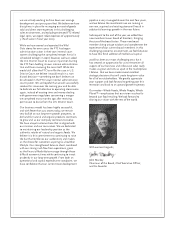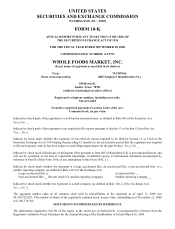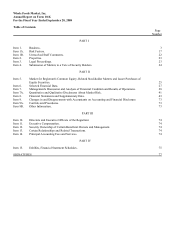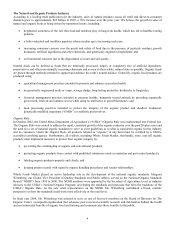Whole Foods 2008 Annual Report Download - page 16
Download and view the complete annual report
Please find page 16 of the 2008 Whole Foods annual report below. You can navigate through the pages in the report by either clicking on the pages listed below, or by using the keyword search tool below to find specific information within the annual report. 10
Whole Foods Market currently purchases produce from over 2,000 different farms through various suppliers. Of the
Company’s top 10 produce suppliers, eight represent independent farms with privately held ownership. We believe we can
and should do more to support local producers. To that end, we have established a budget of up to $10 million to promote
local agriculture, especially animal agriculture, wherever we have stores through long-term loans ranging from $1,000 to
$100,000 at low interest rates. We completed our first loan through the Local Producer Loan Program in February 2007 and
so far have disbursed more than $1.7 million in loans to over 30 local producers company-wide. Loan recipients must use
funds for expansion and not operating expenses, meet Whole Foods Market’s quality standards, and have a viable business
plan and adequate cash flow to service the debt. Eligible products include agricultural crops, value-added food products, and
other all-natural grocery items.
In addition, we provide space in our parking lots throughout the year for local farmers to sell their products directly to our
customers, working in concert with existing farmers’ markets when possible. Our stores have excellent locations and strong
customer traffic to help these farmers’ markets flourish, and their presence at our stores provides more local choices for our
customers. Also, in 2008, we co-sponsored Farm Aid’s 2008 concert to support America’s family farms and raise awareness
about sustaining local agriculture. As part of this sponsorship, our culinary team prepared 4,000 meals at the event using
local products.
Whole Trade
TM
Guarantee
In March 2007, we launched our Whole Trade Guarantee program, a buying initiative that expands our social responsibility
to bring together a set of strict criteria for products sourced from developing countries. In a shrinking global marketplace, the
Whole Trade program is a logical extension of our values that promote quality in everything we do, from products and
business practices to caring for our team members, communities and the environment. The products in this program must
meet specific criteria in four areas of responsibility. They must:
• meet our high quality standards;
• provide more money to producers;
• ensure better wages and working conditions for workers; and
• care for the environment.
Products under the Whole Trade Guarantee meeting these criteria are purchased at a price that is equal to or greater than the
internationally recognized fair trade price. For these products, Whole Foods Market donates 1% of sales to the Whole Planet
Foundation to help end world poverty.
Our Whole Trade Guarantee label is currently featured on over 960 items, and sales of approximately $44 million in fiscal
year 2008 generated approximately $442,000 for the Whole Planet Foundation.
Private Label
An extension of our leadership position in the natural and organic foods industry is our strong family of private label brands.
These products extend the confidence and trust our customers have in our stores to their everyday lives. We have built upon
this trust and over the last several years have significantly expanded our private label resources and offerings, which
currently feature over 2,300 SKUs led by our primary brands, 365 Everyday Value and 365 Organic. These products are
designed to cover the full spectrum of category needs: from the highest quality, value entry-point products to super premium,
unique offerings that cater to true food aficionados. While some of our private label products yield greater margins than their
comparable brand alternative, their primary purpose is to help differentiate our product selection and provide more value
offerings.
In addition to these nationally-driven programs, we have a number of store-made and regionally-made fresh items sold under
the Whole Foods Market label. We also offer specialty and organic coffee, tea and drinking chocolates through our Allegro
Coffee Company subsidiary. In addition, we have developed a grouping of “exclusive” and “control brand” products to fill
out our family of brands. Control brands are brands produced exclusively for Whole Foods Market and not available to other
retailers (e.g., Eternal Water). Exclusive products are either co-branded with the national brand and Whole Foods Market
brand or are a unique formulation or attribute only available at Whole Foods Market. These products help continue to
differentiate Whole Foods Market selections across all aspects of our various product categories. We currently have over 300
exclusive-branded products across the center store.
























